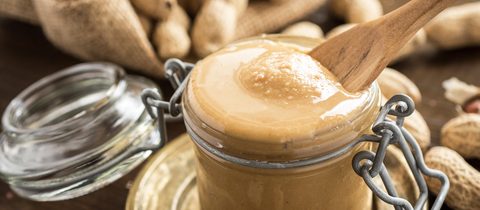Heart Health to Weight Loss: 4 Amazing Benefits of Peanuts!
Wouldn’t it be great if a food that we truly enjoy eating was exceptionally healthy for us? There is: peanuts to the rescue!
We know that a nutrient rich diet is foundational to optimal health and helps protect us from most every illness, disease, faster aging and yes, even weight gain.
When we think of the diseases that affect us the most, heart disease being #1 and cancer #2, it is comforting to know that when we make healthy choices we are actively helping to prevent both.
“Food can truly be medicine since it’s what the body is built on. Making smart choices about what to eat has an impact on everybody – whether you’re young, old, or in between,” says Dr. Samara Sterling, a nutrition scientist and research director for The Peanut Institute. “One easy food to incorporate into a healthy diet is peanuts. They are a powerful weapon because studies have found that a daily serving can deliver significant short- and long-term benefits, including the prevention chronic diseases.”
4 Conditions Where Peanuts Can Help
Heart Disease
Peanuts can be beneficial for heart health due to several reasons:
- Healthy fats: Peanuts are rich in monounsaturated and polyunsaturated fats, which are heart-healthy fats. These fats can help reduce bad cholesterol levels (LDL) and lower the risk of heart disease.
- Fiber: Peanuts are a good source of dietary fiber. Fiber can help lower cholesterol levels, regulate blood sugar levels and promote a healthy digestive system, all of which are important for heart health.
- Antioxidants: Peanuts contain antioxidants, such as resveratrol, which can help reduce inflammation and protect the heart from damage caused by free radicals.
- Arginine: Peanuts are a good source of arginine, an amino acid that can help improve blood flow and reduce blood pressure, which are important factors for heart health.
There are several factors that can raise the risk of developing heart disease, including high blood pressure, high cholesterol, obesity and diabetes. While they may be small, peanuts pack a punch since they are a good source of monounsaturated fats, which have been linked to lowering blood pressure levels and balancing blood glucose.
How about a handful of peanuts twice a day to promote metabolic health?
A 2022 study from the University of South Australia found consuming lightly salted peanuts twice a day before meals led to weight loss, lowered blood pressure and improved fasting glucose levels. And, according to a 2014 study from Purdue University, the benefits peanuts provide for blood pressure are seen regardless of whether peanuts were flavored, salted or unsalted.
Controlling Cholesterol – the Natural Way
Increased LDL cholesterol (aka ‘bad cholesterol’) has been associated with plaque build-up in the arteries, making it harder for them to carry blood to the heart. Peanuts increase HDL cholesterol (aka ‘good cholesterol’) and have healthy mono- and polyunsaturated fats, like those in olive oil and avocados, and are heart healthy overall.
In fact, a one ounce serving of peanuts contains 19 vitamins and minerals, many of which fight heart disease, including vitamin E, folic acid, niacin, magnesium, vitamin B6, zinc, copper and potassium.
Preventing or Controlling Diabetes
Whether you have type 2 diabetes or you are trying to prevent it, the goal is to keep blood sugar levels in check.
With type 2 diabetes, the body loses the ability to use insulin properly. When this happens, blood sugar levels rise and damage blood vessels, which can lead to kidney damage, vision loss, obesity or other complications.
Additionally, prediabetes is when the blood sugar level is higher than what’s considered healthy, but not high enough to be type 2 diabetes. In 2021, 97.6 million Americans age 18 and older had prediabetes.
The good news is that you can effectively manage type 2 diabetes with the right lifestyle choices, including a lower carbohydrate diet that includes peanuts, exercise, stress reduction and 7-9 hours of sleep each night.
A 2016 study from Harvard University showed that substituting a serving of animal protein for a serving of plant protein like peanuts and peanut butter significantly reduced risk of type 2 diabetes. Weight loss can be a welcome result of balancing blood glucose.
Reduced Risk for Cancer and Cancer Mortality
Consuming nuts has shown a significant association with a reduced risk for cancer and cancer mortality.
Several studies have investigated the link between peanuts and their cancer-fighting powers:
- A 10g daily increase in nut consumption has been related to a 20% reduction in overall cancer mortality.
- Peanut/tree nut intake has been associated with 84% lower odds of breast cancer when comparing participants who consumed the most to those who consumed the least.
- In a 2008 study, participants who consumed the most nuts had a 40% reduced risk of esophageal cancer compared to those who consumed none.
- Peanut and tree nut consumption were associated with a reduced risk of small cell carcinoma (a type of lung cancer) per 5g/day increment.
Rather than one component working alone, it’s believed that several compounds found in peanuts band together in a synergistic way to help stop cancer cells from developing. Two of these compounds are phytosterols and resveratrol.
Hungry for Peanuts? Here’s an easy snack – No Bake Protein Balls
Peanuts are highly nutritious and affordable. Regular consumption may improve heart health, lower diabetes risk, help protect us against cancer and cancer mortality and promote a healthy weight.





